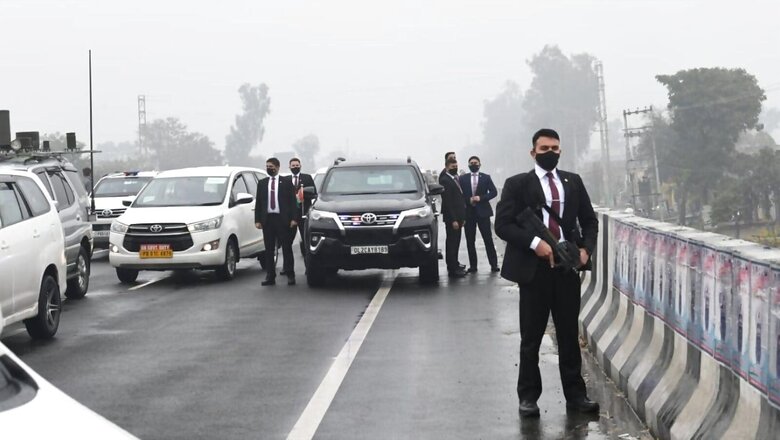
views
Security lapses during the recent visit to Punjab by Prime Minister Narendra Modi can’t be taken lightly. It raises several questions about ensuring security of persons in high places, federalism and also the mutuality between the Centre and the states. While most of these issues are too serious to be ignored, the committee that the Supreme Court is now all set to constitute will hopefully be looking into them too.
While it would be interesting to see how the apex court decides to analyse the issues it would be simplistic to infer that lapses in PM’s security were just the result of communication gap in administration and/or messy handling by the Punjab police. There is reason to believe that personal prejudices of the Congress leadership also might have played some role in this episode. There are at least three pointers suggesting this. First, the tone and tenor of the Punjab chief minister in pooh-poohing allegations of a grave lapse puts a big question mark on the seriousness of CM’s approach. Second, the fact that the Congress leadership is tight-lipped on this subject also speaks volumes.
The third important pointer is the history of ‘politics of personal prejudice’ that the party’s apex leadership routinely indulges in. From Netaji Subash Chandra Bose to Narendra Modi, there is a long list of leaders, both from within Congress and outside, who have been at the receiving end of this ominous approach. Netaji Subash could be easily the first victim of this politics of prejudice. As revealed in the now declassified papers, for almost two decades between 1948 and 1968, then government had placed the Bose family members under strict surveillance. Intelligence bureau officials routinely intercepted letters of the family members of Netaji Subash, once Nehru’s colleague in the Congress.
But Netaji was not alone. Jawaharlal Nehru had allowed his personal prejudices to override the internal democracy in the Congress Party. The first post-Independence victim of this unbridled power commanded by Nehru was Purushottam Das Tandon who was made to resign from the presidentship of the Congress in September 1951. The ‘my way or highway’ approach of Nehru was so evident that post Tandon’s forced resignation Nehru himself became party president, making it clear that he alone who would call the shots.
The next victim of this politics of prejudice was Morarji Desai. In 1969, in her bid to assert her position and establish herself as an unchallengeable leader, then Prime Minister Indira Gandhi took away finance portfolio from Morarji Desai. Although Morarji had some reservations, he had dutifully moved the bank nationalisation-related resolution at the AICC session in Bengaluru in July 1969 and yet he was asked to relinquish finance portfolio days later. Unsurprisingly, an uncompromising Morarji preferred to put in his papers. Post Tandon, Morarji Desai was the second would-be challenger who was victimised for no fault of his.
The third noteworthy person who, thanks to the long-held prejudices by the leadership, was denied even a befitting and respectful funeral in the capital was P.V. Narasimha Rao, when he died in December 2004. Despite giving due respect to the Nehru-Gandhi family, Narasimha Rao never enjoyed a place of prominence in the scheme of the Congress leadership post 1997. Although Narasimha Rao richly deserved respect for his contributions to the party and the government that he led in the difficult decade of 1990s, his family was not allowed to perform last rites of Rao in Delhi. What The Economist had said about Rao is revealing. “Rao had committed the sin of being insufficiently deferential to the Gandhi dynasty while in power. He spent his final years as a pariah. His name was scrubbed from the Congress Party’s lore, and credit for his achievements was given to Manmohan Singh and Rajiv Gandhi.”
Earlier Pranab Mukherjee also had become victim of the prejudices at the apex level. The reason why he was not considered by Gandhis for the top job when the UPA unexpectedly came to power in 2004 was his ‘offence’ of reportedly eyeing the PM’s position immediately after Indira Gandhi’s assassination in 1984. For Mukherjee, this prejudice at the high level proved too costly and he had to leave the Congress party, albeit briefly.
The latest in this series is Narendra Modi. If there is one person to crucify whom the Congress must have used all the dirty tricks at its command, it is Narendra Modi. They ridiculed his abilities, questioned his qualifications, doubted his sincerity, suspected his intentions, challenged his honest efforts and finally conducted a never-ending campaign of calumny—all because of long-held prejudices!
The Congress had used its choicest abuses like Maut Ka Saudagar for Modi. Mani Shankar Aiyar had openly cursed him in an extremely derogatory way, saying that PM Modi will continue to sell tea! Many other lesser leaders too had taken a cue from the leadership and abused PM Modi, bidding good bye to the basic rules of decency and civility. Notably, the Congress neither reprimanded those using abuses nor disassociated itself from them. As against this, PM Modi had not just welcomed dialogue with Rahul Gandhi—when the latter had called on him in the Parliament House—but also suggested that such meetings should happen intermittently.
Harbouring pathological hatred for decades for a leader who has twice secured popular mandate amounts to complete rejection of democracy by the Congress. If not for large-heartedness and humility, at least for the sake of decency and democratic approach, Nehru-Gandhi family needs to end this politics of prejudice.
Vinay Sahasrabuddhe is a BJP Rajya Sabha MP and the President of Indian Council for Cultural Relations. The views expressed in this article are those of the author and do not represent the stand of this publication.
Read all the Latest Opinions here
















Comments
0 comment